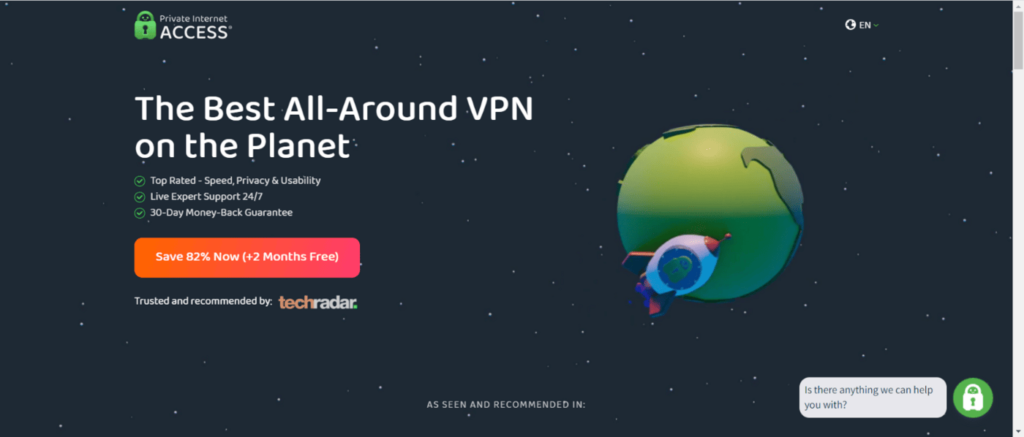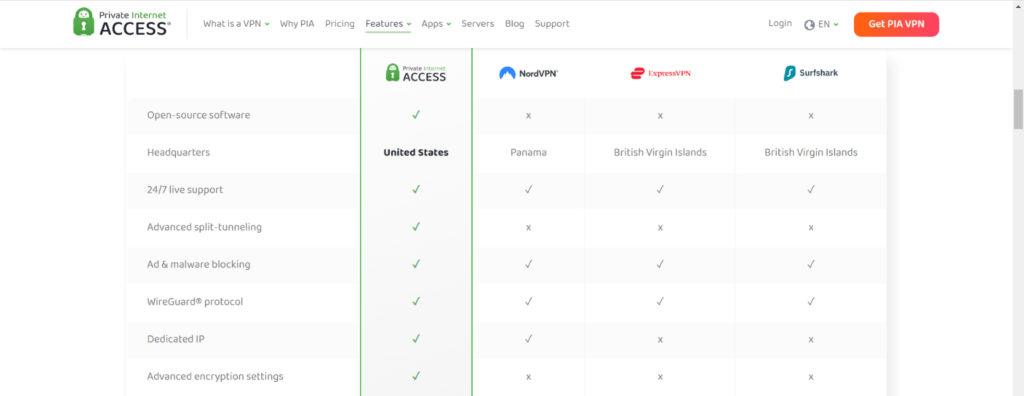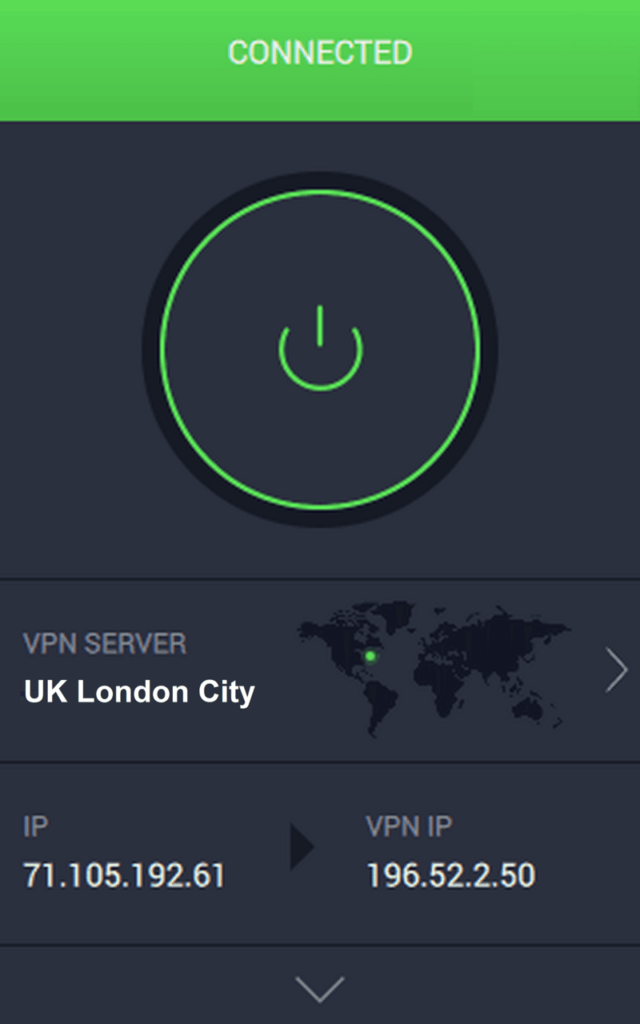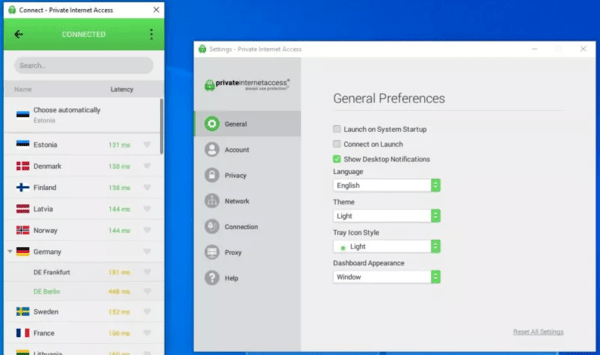Given the vast number of VPN services in the market and the ever-increasing privacy threats, finding a good VPN remains a crucial task.
Of course, you cannot just trust a service blindly for all your sensitive information.
However, some of this industry’s old players are a real-time illustration of the phrase “old is gold.” That’s because such VPNs have continued to survive throughout the years without compromising on their security standards. That’s why they have won an enormous customer base as well.
Private Internet Access is one such VPN that has existed successfully for over a decade.
It offered useful features, ensured privacy, and attracted happy customers. But the latest takeover of this service by a somewhat shady company raised many questions about PIA’s performance.
Has it really gone bad after the deal? Should you still trust this VPN? Let’s check it out via this extensive Private Internet Access review.
Private Internet Access VPN overview

Private Internet Access (PIA) started off back in 2010 as an independent firm offering a quality VPN.
Since its inception, the VPN has attracted more and more customers worldwide due to its ever-expanding features and impressive performance.
In 2019, an Israeli firm Kape Technologies acquired PIA. This company also took over two other VPNs before PIA, CyberGhost, and Zenmate.
That’s where things got a bit dubious, as Kape Technologies bears a shady history. Previously recognized as Crossrider, the company generally holds a bad reputation for its adware distribution and tracking practices.
Nonetheless, Private Internet Access VPN ruled out all concerns as they continued with their premium security best practices even after the merger.
Despite their privacy-oriented operations, trusting Private Internet Access is difficult for many users due to its jurisdiction. The VPN is based in Denver, Colorado, United States.
You might already know that the United States is a part of the 5-Eyes alliance. Thus, you won’t be wrong in suspecting their privacy claims.
However, Private Internet Access has managed to stick to its no-log policy at all costs (more on this below). Since they do not log anything, you don’t have to worry about your data being shared with the governments.
Besides the strict privacy policies, Private Internet Access also offers numerous impressive features that have attracted a vast customer base.
But, before moving on to its exclusive features in this unbiased review of Private Internet Access VPN, let’s take a look at what it generally offers.
Network coverage and servers
The larger a VPN’s network and coverage is, the better. It’s because such VPNs efficiently evade VPN bans, server congestion, and speed issues.
However, finding such a VPN is always tricky.
Nonetheless, Private Internet Access is one such VPN that boasts almost unmatched network coverage.
Can you guess how many servers this VPN would offer generally? You might think of it as up to 8000 or 10,000 servers, but you’re still wrong.
Private Internet Access has one of the largest networks with over 29,000 servers. (At present, their website lists 28,306 servers.)
They have distributed this huge number of servers in 99 locations across 84 countries.
Certainly, they’re comparable to our favorite ExpressVPN, which has a far smaller number of servers, which they have distributed across 94 countries.
While you may not get as many locations with PIA as ExpressVPN offers to you. Yet, PIA works excellent if you need a high-speed, uninterrupted, and secure connection to the same location.
Thanks to its vast number of servers for individual locations, you’ll always enjoy a smooth browsing experience without worrying about network congestion issues.
The provider recently launched a server in every single state of the USA. That means with PIA, you can get IP addresses in all of the 50 US states.
Encryption
While every VPN, whether free or paid, claims to offer superior encryption. But, actually, not all of them are the same.
It’s because not all VPNs can afford to arrange superior encryption technology for the users. Or even if they do, then their performance with regards to speed is below-average.
Thankfully, Private Internet Access VPN has managed to reserve a place among the leading VPNs of today by offering superior encryption without compromising on speed.
Although, PIA has mentioned AES-256-bit encryption to back their VPN. However, we thought to dive deeper to find more details to present it all in this Private Internet Access VPN review for you.
We didn’t have to struggle with that. And we are pleased to share what we found about PIA encryption.
Basically, Private Internet Access offers customizable encryption technology to the users. This allows the savvier users with a bit of technical knowledge to adjust encryption strength as per their requirements.
Whereas the easy explanation on their website even empowers the non-techie users to adjust these settings accordingly.
Precisely, they provide their apps with default encryption settings that are strong enough to protect your privacy.
But they have also shared other suggested settings on their website explaining how they would work to facilitate the users.
Don’t be overwhelmed after reading the terms “handshake,” “authentication,” and others. You can find brief descriptions of all these terms for all users to understand what they’re doing.
VPN protocols
VPN connection protocols play a key role in the optimal performance of a VPN service for any purpose. We have already shared a detailed guide on the different connection protocols and the way they impact the encryption and connection speed.
If you have already gone through that guide, you must know that the more protocols a VPN support, the better it works for all types of users.
So, while writing this Private Internet Access review, we delved into the details of the protocols that PIA supports. And we were pleased to see the variety of connection protocols it offers to the users.
This VPN mainly relies on the OpenVPN protocol by default. Yet, it also supports IPSec/IKEv2 and WireGuard.
Though, not all of these protocols are available across all VPN clients in the same way. Yet, they have managed to offer all the protocols that a user may frequently have to use.
Here’s a quick breakdown of this availability across the different VPN clients.
Desktop: OpenVPN, WireGuard
iOS: OpenVPN, IPSec, WireGuard
Android: OpenVPN, WireGuard
IP and DNS leak protection
A VPN is meant to protect your security by hiding your real details and making you anonymous online. Hence, it will be of no good if it continues to leak your real information, especially your real IP address.
If this happens, you can neither access geo-restricted websites and streaming platforms nor enjoy safe gaming, torrenting, and other purposes.
Despite this being an established fact, many VPN services, including some popular ones, fail at ensuring IP leak protection. That’s because they do not support IPv6.
Fortunately, PIA VPN isn’t among those leaky VPNs.
While Private Internet Access VPN also does not support IPv6, it employs a robust IP leak protection strategy by entirely blocking the IPv6 traffic. Hence, you don’t have to worry about accidental exposure to your real location online.
Besides, it also applies DNS masking by offering PIA DNS as default. Though you can choose to change the DNS as you like.
Kill-Switch
Another essential feature that we deem a must-have for every VPN service is the kill switch. This amazing functionality is the key to maintaining your online security as it prevents accidental exposure of your real IP address online in case of VPN drops.
Despite being necessary, many VPNs, unfortunately, do not offer this feature, even the paid ones.
However, Private Internet Access VPN has got you covered as it comes default kill switch across its desktop, Android, and iOS apps.
This feature comes as a simple Kill Switch toggle for the users offering three different settings on the desktop client. By default, the toggle is set to “Auto.” Yet, you can turn it “off” manually. You can also set it as “Always” that blocks the internet traffic whenever the VPN app is off.
However, you have to switch to the “Off” or “Auto” options if you need to use the internet on your device without the VPN. Otherwise, this always-on kill switch won’t let you go online without activating your VPN connection.
In the case of iOS, a simple toggle option is available in the settings menu.
Whereas, for Android, a separate Kill Switch option is available only with OpenVPN for Android versions below 8.0. However, for Android 8.0 and above, the “Block Connection Without VPN feature” works as Kill Switch.
Data logging policy (no-logs)
With regards to data-logging, Private Internet Access is an ideal VPN that has set an example for all other VPNs to follow. While other VPNs either blatantly maintain your data logs or justify their logging activities by false claims and lies, PIA has stuck to just one policy ever – no logs!
You might wonder how come PIA ensures this no-logging practice when it’s based in the US and is owned by a shady company Kape Technologies.
Of course, these two things can compel any VPN service to log users’ data either partially or aggressively. We already have examples of McAfee Safe Connect (a US-based VPN) and CyberGhost (owned by Kape Technologies) that log your data to different extents.
Nonetheless, PIA has demonstrated how to abide by all the regulations without compromising your own standards.
Even after their merger with Kape Technologies, PIA continues to maintain no data logs for its users.
And to back this claim, numerous real-world cases are available. For instance, in 2016, PIA was asked to share logs for investigating a fake bomb threat arrest case. All PIA could provide was a “cluster of IP addresses from a particular region.
Likewise, in 2018, when subpoenaed regarding a hacking attack investigation, PIA could not provide any logs.
Besides, PIA has set up a dedicated Transparency Report page on their website where they mention all such instances.
But what if the government(s) force them to keep logs? We hear you ask.
Well, Private Internet Access VPN answered this question by quoting a 2016 incident when Russia seized its servers, allegedly for keeping no laws. In response to Russian activity, PIA simply shut down its Russia operations instead of agreeing to compromise user security. Since they didn’t log users’ data, they didn’t have any privacy concerns.
Private Internet Access VPN key features

Until this point, we have elaborated on the general features common to most VPN services. Certainly, PIA has exhibited impressive results across all those parameters.
Now, proceeding further with this honest review of Private Internet Access VPN, let’s take a look at whether this VPN has anything unique for its users.
For example, Surfshark is a classic VPN bearing a bunch of fancy features for the users to jazz up their anonymous browsing experience.
Can PIA VPN beat Surfshark?
Maybe, no, because its list of special features doesn’t look as exhaustive as that of the Surfshark. However, it still bears everything to provide above-average security to the users.
Split-tunneling
Despite being a must-have to protect your online security, a VPN may interfere with some of your routine activities. In such situations, you need to switch off your VPN temporarily. However, even this temporary suspension of VP risks your privacy, mainly when you’re using public WiFi.
For example, you may have trouble signing in to your online banking account with a VPN.
Likewise, you might lose access to a locally available when you’re connected to a distant server. Or, you may have to use certain apps or websites that are IP-specific.
Wouldn’t it be a burden to keep meddling with your VPN connectivity every time you need to use such a service?
You don’t have to face this trouble with the Private Internet Access VPN. It’s because PIA comes with the worthy split tunneling feature.
With PIA VPN, it’s a beautiful utility that not only lets you allow certain apps to run outside of the VPN. Rather it also allows you to manage IP addresses similarly.
Plus, you can also mark specific apps and websites to run with the VPN only. This is a handy feature for services with aggressive tracking, or the platforms that link with you personally, such as Facebook, as restricting these apps with VPN only won’t let anyone access your real IP address ever, not even the service.
However, since the restricted apps won’t run without the VPN connection, you’ll have to turn this feature off if, at any time, you need to use such a service without the VPN.
Proxy (double-hop)
Another useful feature that Private Internet Access VPN has for you is the Proxy or “double-hop.”
It’s a wonderful feature that enhances your internet anonymity by rerouting your data traffic twice through the VPN servers. In this way, your VPN IP address masking your real IP gets further veiled into another IP and location. Hence, you become almost impossible to track.
This feature isn’t common with most VPNs. VPN providers must have a lot of technical expertise to offer this feature without compromising your browsing speed.
Fortunately, PIA is an advanced VPN that has come up with a smooth practice. They allow you to use a proxy to further mask your location after connecting to a VPN server.
For this, they offer two different proxy technologies to you; SOCKS5 and Shadowsocks. The service provider introduced the SOCKS5 proxy with the release of app version 1.4.0. Whereas, Shadowsocks was rolled out with version 1.7.
Shadowsocks, however, isn’t available for all servers. So, if you want to use this proxy, you can either adjust the settings to “Auto” and let the app choose a Shadowsocks-enabled server from your selected location or the one nearest to you. Or, you can manually go through the list of supported servers and pick the desired server yourself.
Private Internet Access VPN security add-ons
Aside from the regular features of the VPN, Private Internet Access offers some more features to protect your privacy further.
While these features have no direct impact on data encryption and anonymity, they indirectly make your browsing experience safe by letting you fend off malicious attempts.
Identity Guard
Since data breaches are becoming a commonplace thing, your emails are prone to falling into the hands of perpetrators. Thus, you need to frequently monitor your email address for any possible appearance in breached data.
While many such services exist that separately monitor this thing for you, you get this feature as an add-on with PIA VPN. Named “Identity Guard”, this feature appears as a separate setting within the Client Control Panel.
Using this feature, you can check any of your email addresses for a possible appearance in breached data available publicly.
MACE adblocking feature
Besides protecting you from web trackers by masking your IP, PIA VPN brings one more feature that evades tracking and smoothens your browsing experience. It is the ad-blocking feature MACE.
Developed by Private Internet Access, MACE technology protects you from intrusive ads like an ad blocker. However, its functioning is different (and somewhat better) than traditional adblockers.
Precisely, regular adblockers work by preventing the browser from sending requests to the tracking websites after the browser queries the website’s IP address from the DNS server.
Whereas, when MACE is enabled, when the browser queries the IP address of the tracking website from the DNS server, the VPN returns the response as “127.0.0.2” – the local machine. Hence, your browser simply doesn’t make any requests.
Although MACE works pretty well in blocking ads, you should understand that it isn’t a substitute for a dedicated adblocker. It misses out on some critical settings, such as domain whitelisting. Plus, it is also not as aggressive as the ad blockers.
If you really wish to use a VPN with the ad-blocking feature, NordVPN or Surfshark may serve you better.
Two-factor authentication
While the VPN protects your data from cyber threats, it also allows you to protect your VPN credentials via two-factor authentication.
You can simply set up this option by signing in to the Client Control Panel.
Private Internet Access VPN user experience
After discussing all the features, you might wonder how it feels to use the VPN on your device.
Curious to find it out, our team tested this VPN across numerous devices. Here we elaborate on our hands-on experience with Private Internet Access VPN.
Web and app interface

Private Internet Access has definitely worked hard to come up with an inclusive solution for you. This is reflected in the way their website and apps have been designed.
From a pleasant theme to the clear-cut and easy-to-navigate options, you won’t face trouble finding your desired information from their website.
We particularly liked their “helpdesk” section that includes answers to almost all of your queries. This section even helped us to cross-verify the availability and functionality of different features. So, whenever you face trouble in configuring the app on your device, you can simply visit their support section for assistance.
Although, you won’t likely face any trouble because the apps also exhibit a user-friendly interface. You’ll get all the options stacked in the main menu. In contrast, the main screen bears a neat layout displaying the important connection information only.
Speed test
While Private Internet Access VPN bears pretty impressive features, it didn’t really satisfy us when we put it to the speed test.
We tested the VPN on Mac and Windows devices and found it inconsistent with speed on both.
| Location | Download (Mbps) | Upload (Mbps) |
|---|---|---|
| Australia | 68.75 | 78.56 |
| Japan | 58.64 | 85.11 |
| Switzerland | 293.17 | 253.27 |
| UK | 141.66 | 220.38 |
| US (NY) | 113.98 | 167.69 |
In brief, with our base speed of 150 Mbps, we experienced a 5-10% speed drop on Windows. While that’s already too much, we observed a 15-20% drop in Mac.
Besides, we found that the different servers performed differently with regard to speed. Some of them were really poor, while some worked fine. So, as a user, you have to be very careful about choosing the VPN.
Simultaneous device connections
With regards to simultaneous device connections on a single account, the only VPN that has impressed us until now is Surfshark, which supports unlimited devices.
Nonetheless, it doesn’t mean that the other VPNs are worthless. VPNs like ExpressVPN and NordVPN have their own pros; because of this, the limited number of device connections becomes trivial.
In the case of Private Internet Access, they seamlessly allow ten device connections on a single account – just like CyberGhost VPN.
It means you get an excellent opportunity to protect all your devices without paying extra.
Device compatibility
The number of simultaneous connections a VPN supports is useless if the VPN cannot support all of your devices.
Thankfully, you would likely not face such troubles with Private Internet Access. It’s because this VPN offers dedicated VPN clients for all major platforms.
Besides, it also comes with a VPN app for routers. This will let you set free from device connection limitations and protect your home network.
While PIA VPN misses out on other vital platforms, such as smart TV and gaming consoles, you can protect those devices as you set up the VPN on your router.
Download and setup
Like the best VPNs of today, the service offers a swift Private Internet Access download and installation process.
Regardless of your device, simply visit the PIA’s website and register yourself by subscribing to an appropriate pricing plan. After that, you can proceed to download the respective VPN client on your device.
Once the setup executable downloads on your device, you can tap or click on it to initiate the installation process. Once done, you can then sign in to the VPN using your credentials.
In case you forgot to register with the service earlier, you can click on the “Buy account” option to subscribe after completing the PIA VPN download.
And this is it! Your anonymous journey to the online world will begin right after you start your VPN connection.
Customer support
Like any other software, VPNs are prone to exhibiting technical glitches. At the same time, some users may get confused while configuring the app. In all such situations, you should get in touch with the service provider for assistance.
Hence, our team checked on PIA’s customer support options. The service offers a live chat option along with support tickets.
We tried to reach out to them but weren’t really impressed. At first, we had to submit our details (name, email address) to initiate the chat. (This could have been made optional features.) Still, we couldn’t connect to a support agent.
Nonetheless, their overall support section includes lots of guides, tutorials, and FAQs. So, as a customer, you can find the answers to most of your queries. However, you may not find their support useful in emergencies.
Using PIA VPN to unblock Netflix and streaming sites
If you merely need a VPN to unblock Netflix or any other streaming platform in a geo-restricted location, then PIA isn’t a go-to choice.
While the VPN exhibits numerous good features to provide anonymity to you, it isn’t strong enough to repel VPN blocking attempts. Perhaps, that’s the reason why PIA users frequently see errors when trying to stream with this VPN.
We could only stream Netflix USA with some US servers even in our tests. After that, we couldn’t switch libraries. Nor could we use it for unblocking Hulu and BBC iPlayer. (Although, they have recently set up a dedicated London streaming server for iPlayer. Still, they haven’t assured a flawless performance.)
Perhaps, you can use NordVPN or ExpressVPN instead that defiantly unblocking all major streaming platforms whilst evading all blocking attempts.
You can also check out these lists of the best Netflix VPNs to unblock Netflix anywhere or the top UK VPNs to access BBC iPlayer.
How about using PIA for gaming?
We won’t recommend the Private Internet Access VPN for gaming.
No, we aren’t talking about any privacy issues here. It’s just that, as we stated above, PIA doesn’t offer consistent speed.
So, for gaming, where you need superfast connections to remain in action, slower VPNs prove a disaster – so does PIA.
If you want to enjoy a secure gaming experience, the likes of ExpressVPN are there for you.
(Check out our comprehensive list of the best gaming VPNs to find what will suit you.)
Is Private Internet Access (PIA) VPN safe for torrenting?

While PIA isn’t great for streaming, it does work really well for torrenting.
At first, PIA clearly mentions full P2P support on all servers on its website. Plus, the VPN works excellent for ensuring thorough online anonymity.
So, unless speed isn’t a big issue for you, you can use PIA easily for torrenting anywhere.
Though, the only concern with PIA is their US jurisdiction. If you think your torrent would fall into the category of copyright infringement, and you’re in the US, then using PIA VPN isn’t a wise decision.
Although, it isn’t an issue to ponder over since PIA has a tested zero-logs policy.
Yet, as a precaution, you can instead choose some other VPNs best for torrenting that are based outside the US.
Does Private Internet Access work in China?
Unfortunately, Private Internet Access isn’t the most suitable VPN for China and other similar countries.
It’s not only because of their US jurisdiction that binds them to not operate in countries banned by the US. Rather, due to the repressive policies of other countries like China, Turkmenistan, UAE, and others, PIA can’t offer smooth service there.
If you’re looking for a robust VPN provider that bypasses China’s Great Firewall, check out some of the best China VPNs here.
Can I use PIA VPN with Tor?
Just like its sister VPN CyberGhost, Private Internet Access VPN also offers tremendous support for TOR.
That means you can enjoy a superior anonymous browsing experience by combining the two outstanding technologies – VPN and TOR.
However, as PIA recommends, make sure that you turn on your VPN first before connecting to TOR. In this way, your ISP won’t know about your use of TOR.
The only problem in using PIA VPN with TOR is speed. As you now know, PIA VPN sometimes exhibits speed lags. So, your overall connectivity may drop drastically when coupled with TOR, which already slows down the speed.
Private Internet Access VPN pricing plans

“Fine with all the features and downsides; how can I subscribe to this VPN?” We hear you ask.
Well, Private Internet Access VPN is one of those few services that offer good services at affordable costs.
Though not as cheap as Surfshark, PIA VPN isn’t as expensive as ExpressVPN either.
The VPN offers three different monthly, yearly, and bi-yearly subscription plans. The latter is the most affordable plan that costs under $2.20 per month.
If you’re hesitant to pay a bulk amount for a long-term subscription, don’t worry because PIA VPN also offers a 30-day money-back guarantee. It means you either get satisfactory services via your subscription or your money back.
If you’re wondering how to pay the subscription fee, don’t worry because the service providers accept a lot of payment methods. You can either use them via PayPal or card or even ensure anonymous payments via cryptocurrency.
Conclusion
Here we wrap up our detailed Private Internet Access review.
Overall, Private Internet Access (PIA) is a nice VPN with numerous cool features. Despite having the United States as its base, PIA doesn’t have any intrusive policies. They have remained stuck with maintaining zero-logs for years and have withstood subpoenas as well without ditching their customers.
While slight speed lags and failure to survive in repressive regions like China add to its cons. It does have a lot more to admire, from premium security features to robust customer data privacy.
If at all you need to use a US-based VPN, Private Internet Access VPN is an excellent choice.
